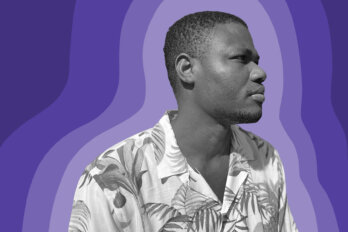In 2018, The Walrus published an excerpt from Jason Guriel’s then forthcoming Forgotten Work, an ambitious verse novel which would eventually appear in 2020—and which the New York Times would declare “unlikely, audacious and ingenious.”
Last month, Biblioasis published Guriel’s second verse novel, The Full-Moon Whaling Chronicles. Set in the same universe as Forgotten Work and composed in rhyming couplets, Guriel’s epic new book is already drawing accolades; Liz Braswell, in the Wall Street Journal, writes, “Without question this is the most imaginative piece of young-adult-adjacent fiction I have ever read. It’s a big wolfy huff-and-puff of fresh air in a genre swamped with tired plots and love triangles.”
Set in the year 2070, The Full-Moon Whaling Chronicles follows Kaye, an English literature student, as she searches for the reclusive author of a YA classic about seafaring werewolves. In the following excerpt, taken from chapter six, Kaye is returning to her dorm room and enjoying the sunlight—a novelty. (A cloud of garbage orbiting the Earth had only just mysteriously dissolved the year before . . . )
The sun was shining overhead, a fact
Kaye wasn’t used to yet. The Cloud had cracked
About a year before, and for the first
Time in her life she’d felt real warmth, her thirst
For light a thing. She’d seen the moon as well,
In all its phases. It would cast a spell
On people out for walks when it appeared.
They’d stop, look up, and point. Some even cheered.
Most governments had given up on solving
“Cloud Disintegration” (trash dissolving
On its own inside the exosphere)
And scientists were stumped; there was no clear
Cause for the sudden, stunning dissolution
Of the Cloud. The far right cried, “Illusion!,”
Claiming that the Cloud was still in place
And that projected stills of outer space
Were being cast by “globalists and Jews.”
But there were many onzuck lies to choose
From. Some believed the reemergence of
The stars was proof of concept for God’s love;
At last, the Second Coming had begun.
Still others, skeptics, argued that the sun
Was just a massive, flaming ball of gas.
New Marxists viewed the Miracle through class.
***
Turning off the central quad, Kaye passed
A long wall, several metres high, of glassed-
In boxes: dioramas stacked like cinder-
Blocks. A waist-high moat—designed to hinder
Those who might feel tempted to tap on
The dioramas’ windows—ran along
The bottom of the wall. Some panes were clear,
While others were opaque. Kaye paused to peer
Across the moat at one specific pane.
Without her body’s presence to explain
The scale, the stacked-up boxes would’ve looked
Like normal condos, and the moat that hooked
Around the far end of the wall, a pliant
River. Kaye, though, loomed above: a giant.
Someone had appeared now at the pane.
Kaye knew that he’d be smiling (in vain).
His name was Owen. They’d hooked up, though only
One time. Frosh week. His dorm. She’d been lonely;
He’d been simply there, a boy who meant
Well. But he’d struggled. Floating near, consent
Bots (issued by the university’s
Directorate for Dorm Diversities)
Had tracked the groping couple’s every move.
At last, he’d stopped; he couldn’t find a groove,
He’d said. She’d guessed that meant he wasn’t hard.
A poster on his wall said “Avant-Bard.”
She waved back, weakly. Then, she turned her head
(Kaye passed his window every day with dread)
And hustled to the far end of the wall,
Adidas crunching leaves. She loved the fall.
A flyer on a post displayed an ad
For Nick Drake’s music, which was leafy. Sad.
Perhaps the pixiepaper had explored
Her mind to source an artist she adored?
The sky above was filled with pigeons; they
Were streaming from the campus coop, a grey
And looming turret in the centre of
The quad. (It made Kaye think of courtly love.)
The pigeons carried mail. Each one was made
Of pixiepaper, beak a 2-D blade.
She reached a booth: a tube of frosted glass.
The glass yawned open. (It had scanned the pass
Admissions had installed: a makeshift mole
On Kaye’s left cheek.) A floating holo scroll
Began unfurling. Terms of Use. “Accept,”
She said. Unread, the scroll re-rolled. She stepped
Inside the booth.
The hole the glass had made
Began to shrink, its curving edge a blade.
She knew that if she stuck a hand inside
The quickly shrinking iris—if she tried
To fuck with it—the glass would pause and not
Chop off her hand. But stupid kids had caught
Their limbs in glass before; she kept her hands
On knapsack straps.
The booth performed its scans.
The glass turned green: OKAY. She closed her eyes
And felt her body dematerialize
In seconds. When she opened them, she found
Herself indoors, the street’s noise—background sound
She’d barely noticed—now abruptly muted.
It was as if her ears had been rebooted
At a lower volume.
Skin still forming,
Kaye stood on the doorpad in her dorm.
A beige and beat-up couch, its squat legs castered,
Rolled toward her. Full-Moon posters plastered
Several walls. A single sock, a widow,
Languished on the floor. One wall, a window,
Faced the lane she’d only just walked down.
She felt deep thumps; the prefect in his gown,
Still mounted on his dane, rode past her pane
Of glass. The whole room shook as if a train
Were rattling by.
The booth had scanned Kaye’s “chasms”—
Basically, the gulfs between her atoms—
Then collapsed the gulfs a bit so she
Could fit inside her dorm. She’d read of flea-
Sized families, thousands to a tenement
In less-developed countries. Negligent
(Or fascist) governments were shrinking people
To a scale that had been deemed illegal.
Several global treaties had decreed
That bonsai hives designed for those in need
Could only shrink a person to a size
A healthy human eye could scrutinize.
And yet, as coastlines crumbled, countries shrank
And space became more precious. So-called “tank
Life” had become a low-cost option for
Communities retreating from the shore.
On campus, those in need of student aid
Were placed in tanks. More well-heeled students stayed
In full-sized antique dorms with pedigrees:
Old turrets, ivy, doors demanding keys.
(Those status-anxious types, who liked to dangle
Wealth, would wear their keys on belts; the jangle
Was a sign of class, while left-cheek moles,
Which bonsai dwellers bore, suggested proles:
A downcast, orphan folk.)





